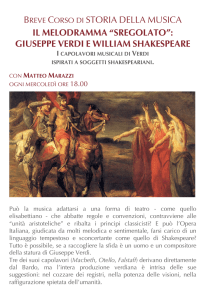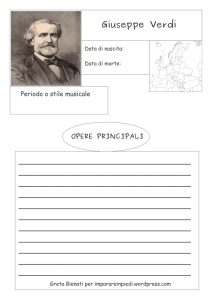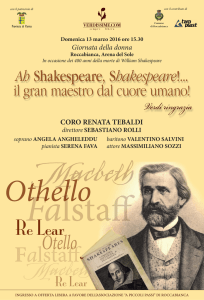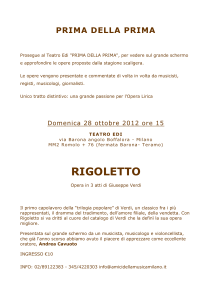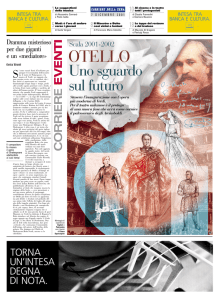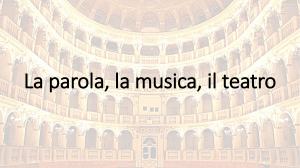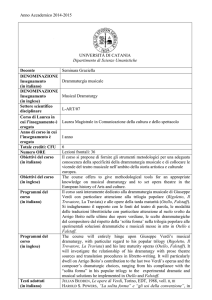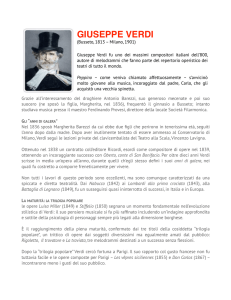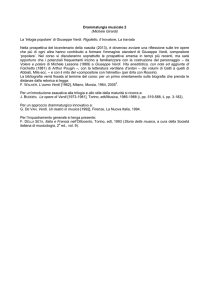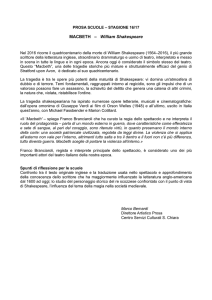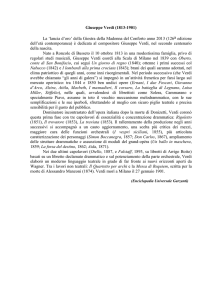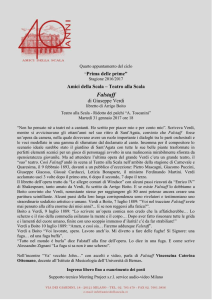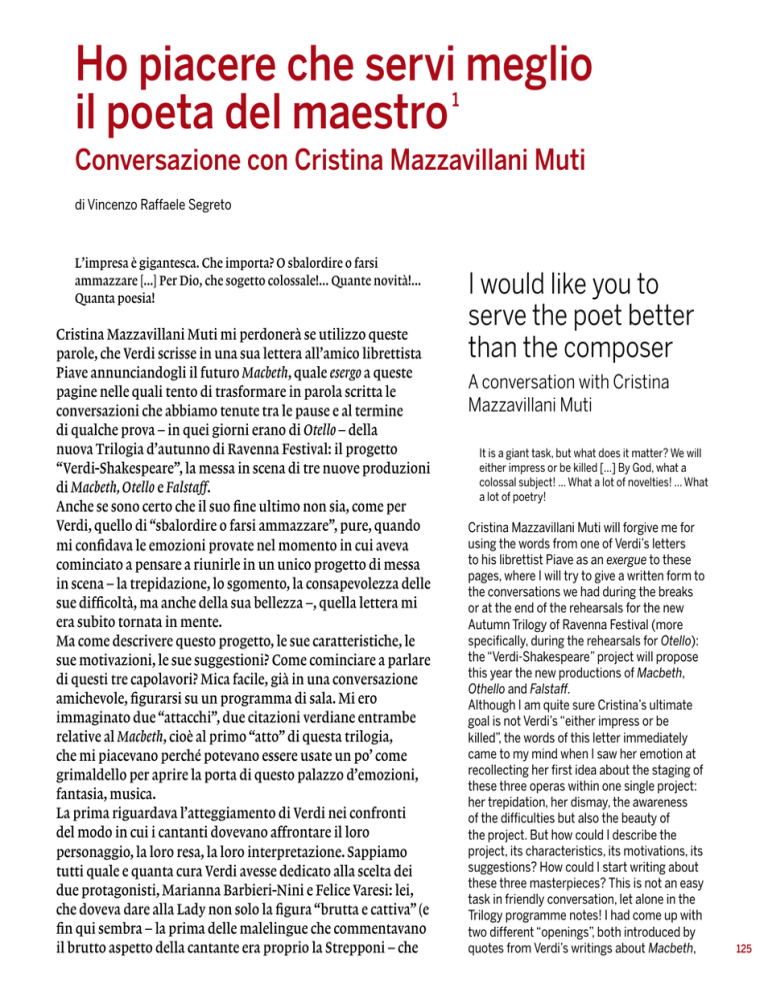
Ho piacere che servi meglio
il poeta del maestro
1
Conversazione con Cristina Mazzavillani Muti
di Vincenzo Raffaele Segreto
L’impresa è gigantesca. Che importa? O sbalordire o farsi
ammazzare [...] Per Dio, che sogetto colossale!... Quante novità!...
Quanta poesia!
Cristina Mazzavillani Muti mi perdonerà se utilizzo queste
parole, che Verdi scrisse in una sua lettera all’amico librettista
Piave annunciandogli il futuro Macbeth, quale esergo a queste
pagine nelle quali tento di trasformare in parola scritta le
conversazioni che abbiamo tenute tra le pause e al termine
di qualche prova – in quei giorni erano di Otello – della
nuova Trilogia d’autunno di Ravenna Festival: il progetto
“Verdi‑Shakespeare”, la messa in scena di tre nuove produzioni
di Macbeth, Otello e Falstaff.
Anche se sono certo che il suo fine ultimo non sia, come per
Verdi, quello di “sbalordire o farsi ammazzare”, pure, quando
mi confidava le emozioni provate nel momento in cui aveva
cominciato a pensare a riunirle in un unico progetto di messa
in scena – la trepidazione, lo sgomento, la consapevolezza delle
sue difficoltà, ma anche della sua bellezza –, quella lettera mi
era subito tornata in mente.
Ma come descrivere questo progetto, le sue caratteristiche, le
sue motivazioni, le sue suggestioni? Come cominciare a parlare
di questi tre capolavori? Mica facile, già in una conversazione
amichevole, figurarsi su un programma di sala. Mi ero
immaginato due “attacchi”, due citazioni verdiane entrambe
relative al Macbeth, cioè al primo “atto” di questa trilogia,
che mi piacevano perché potevano essere usate un po’ come
grimaldello per aprire la porta di questo palazzo d’emozioni,
fantasia, musica.
La prima riguardava l’atteggiamento di Verdi nei confronti
del modo in cui i cantanti dovevano affrontare il loro
personaggio, la loro resa, la loro interpretazione. Sappiamo
tutti quale e quanta cura Verdi avesse dedicato alla scelta dei
due protagonisti, Marianna Barbieri-Nini e Felice Varesi: lei,
che doveva dare alla Lady non solo la figura “brutta e cattiva” (e
fin qui sembra – la prima delle malelingue che commentavano
il brutto aspetto della cantante era proprio la Strepponi – che
I would like you to
serve the poet better
than the composer
A conversation with Cristina
Mazzavillani Muti
It is a giant task, but what does it matter? We will
either impress or be killed [...] By God, what a
colossal subject! ... What a lot of novelties! ... What
a lot of poetry!
Cristina Mazzavillani Muti will forgive me for
using the words from one of Verdi’s letters
to his librettist Piave as an exergue to these
pages, where I will try to give a written form to
the conversations we had during the breaks
or at the end of the rehearsals for the new
Autumn Trilogy of Ravenna Festival (more
specifically, during the rehearsals for Otello):
the “Verdi-Shakespeare” project will propose
this year the new productions of Macbeth,
Othello and Falstaff.
Although I am quite sure Cristina’s ultimate
goal is not Verdi’s “either impress or be
killed”, the words of this letter immediately
came to my mind when I saw her emotion at
recollecting her first idea about the staging of
these three operas within one single project:
her trepidation, her dismay, the awareness
of the difficulties but also the beauty of
the project. But how could I describe the
project, its characteristics, its motivations, its
suggestions? How could I start writing about
these three masterpieces? This is not an easy
task in friendly conversation, let alone in the
Trilogy programme notes! I had come up with
two different “openings”, both introduced by
quotes from Verdi’s writings about Macbeth,
125
126
which will be the first “act” in the trilogy. I liked
them because they could be used as a sort of
“crowbar” to open the door to this “building” of
emotions, fantasy and music.
The first quote concerned Verdi’s attitude to
his singers: he clearly knew how they had to
deal with their character, their performance,
their interpretation. We all know the care
Verdi had dedicated to the choice of his two
protagonists, Marianna Barbieri-Nini and
Felice Varesi: he wanted Lady Macbeth to be
“ugly and evil” (a request Barbieri-Nini could
perfectly and effortlessly meet – Strepponi
was apparently the first to comment on the
singer’s poor looks!), and to have “a harsh,
stifled and hollow voice [...] with a diabolical
quality”. Varesi, instead, was chosen because
ella potesse perfettamente rispondere alle richieste verdiane),
ma anche “una voce aspra, soffocata, cupa [...] che dovrebbe
aver del diabolico”, come scrisse Verdi; lui, che dal compositore
si meritò l’encomiastico elogio d’essere “il solo artista attuale
in Italia che possa fare la parte che medito, e per il suo genere
di canto, e per il suo sentire, ed anche per la stessa sua figura”,
tanto da essere stato da lui scelto quale primo interprete anche
di Rigoletto e di Germont.
È risaputo che le prove svolte per la prima fiorentina furono
in numero enorme per le abitudini dell’epoca (forse 150),
eppure, quasi al termine di quel massacrante (immaginiamo)
percorso, Verdi ebbe ancora da uscire in questa vera e propria
dichiarazione d’estetica e interpretazione teatrale, tanto
lapidaria quanto significativa, rivolta a questo suo favorito
interprete:
Io non cesserò mai di raccomandarti di studiare bene la posizione
e le parole: la musica viene da sé. Insomma, ho piacere che servi
meglio il poeta del maestro.
Parole che, secondo me, potevano ben servire per cominciare
a parlare con una regista della sua idea di messa in scena di
un’opera.
La seconda “via” che mi ero preparato era un’altra citazione
verdiana che riguardava l’esecuzione parigina del Macbeth nella
sua nuova edizione (1865) rivista in molti, e non secondari,
punti: quando, alle critiche rivolte a Verdi da chi lo accusava di
non conoscere il drammaturgo inglese, il compositore rispose
protestando con veemenza, come leggiamo in questa lettera a
Léon Escudier:
Può darsi che io non abbia reso bene il Macbeth, ma che io non
conosco, che io non capisco e non sento Shaspeare [sic] no per Dio,
nò. È un poeta di mia predilezione, che ho avuto fra le mani dalla
mia prima gioventù e che leggo e rileggo continuamente.
Se la prima citazione riguardava dunque l’opera “dal di
dentro”, cioè una regola interpretativa (e quanto eloquente!),
questa affrontava un aspetto a monte, cioè quello del rapporto,
dell’influenza – intensi sia a livello artistico che, e forse
ancor più, umano – che Verdi dichiarava di aver avuto con e
da Shakespeare, il drammaturgo secondo solo a Schiller in
quanto a numero di opere da lui tradotte in musica: quattro
per Schiller (Giovanna d’Arco, I masnadieri, Luisa Miller, Don Carlo)
e tre per Shakespeare (naturalmente Macbeth, Otello e Falstaff,
che, forse non occorre ricordare, in Shakespeare non è un’opera
sola ma un personaggio che vive in più commedie). Che strano,
però! Nel gigantesco epistolario verdiano, pochissime sono le
citazioni del grande drammaturgo tedesco che vadano al di là
del momento dell’elaborazione del libretto, numerosissime
invece (e sempre ammirative) quelle che riguardano il Bardo, a
testimonianza dei rapporti ben diversi intessuti da Verdi con
essi: “Infatti – come scrive la studiosa di letteratura romantica
Federica Troisi – la sintonia con Schiller [...] legata a valori
etici – quali la ragion di stato, il senso dell’onore e del dovere
– [dei quali, aggiungiamo noi, Verdi accentua in maniera
decisiva l’influenza nella sfera privata] risulta meno esplicita
rispetto a quella dirompente stabilita con Shakespeare fin
dalla giovinezza e coltivata per tutta la vita”. La vicinanza con
Shakespeare sembra andare ben al di là dell’ammirazione
he was “the only artist in Italy at the present
time who, by virtue of his style of singing, his
sensibility and his actual appearance, could do
the role I have in mind” (he will then be chosen
again to create the title role of Rigoletto, and as
the original Germont).
It is well known that the rehearsals for the
debut in Florence were many more than
usual (about 150), and yet, at the end of that
gruelling (at least we can imagine it so!) work
schedule, Verdi came out with the following
declaration to his favourite interpreter, a
lapidary but significant statement on his
aesthetic and theatrical ideals:
I shall never stop urging you to study carefully the
context and the words: the music comes by itself.
In short, I would like you to serve the poet better
than the composer.
I reckoned these words would be suited to
start talking with a director about her idea of
opera staging.
The second “opening” I had prepared was
a quotation concerning the new version of
Macbeth, restaged in Paris in 1865 after
several important changes: this is how Verdi
vehemently replied to the accusation of not
knowing the English playwright (from a letter
to his French impresario, Léon Escudier):
It may be that I have not done justice to Macbeth,
but to say that I do not know, understand and
feel Shaspeare [sic]: no, by God, no! He is one of
my favourite poets. I have had him in my hands
from my earliest youth, and I read and reread him
continually.
Thus, if the first quote concerned the opera
“from within”, eloquently providing a rule
for its interpretation, the second quote
concerned an “upstream” aspect, namely the
intense artistic and human relationship and
influence Verdi claimed with Shakespeare, a
playwright who was second only to Schiller in
terms of the number of works he translated
into music: four by Schiller (Giovanna d’Arco,
I masnadieri, Luisa Miller, Don Carlo) and
three by Shakespeare (obviously Macbeth,
Otello and Falstaff, which is not a play
but a recurring character from several of
Shakespeare’s plays). It’s funny, though! In
127
128
Verdi’s huge collection of letters, the name of
the German playwright appears in very few
instances, usually dated at the time of drafting
the librettos. The Bard, instead, appears in
quite a number of admiring quotations, as a
proof that Verdi’s relationship with the two
men of the stage were quite different: as the
Romantic literature scholar Federica Troisi
wrote, “Verdi’s relationship with Schiller, [...]
based on such ethical values as reasons of
state, the sense of honour and duty – [and,
we might add, their decisive influence on the
private sphere], is far less explicit than the
disruptive relationship with Shakespeare,
established in his youth and cultivated for a
lifetime.” Verdi’s attachment to Shakespeare
seems to go far beyond admiration, and
testifies to a peculiar congeniality, a perfect
harmony with his own nature. His nature as a
(musical) playwright, but also his nature as a
man, since the core of their theatre lies in the
nature of man, in the tangle of human passions
as told by Shakespeare and translated into
music by Verdi. The action, or the unfolding
of the action, is no longer the essence of the
plot. The dramatic action becomes an internal
action and vice versa, and the internal action
becomes the core of Verdi’s theatre: the same
core he found in Shakespeare.
“Equipped” with these two keys to the “door”
of our conversation, I was present at some
of the stage rehearsals, and listened to some
of Cristina’s conversations with the young
participants of the VerdiWeb 2.013 project.
I soon realized that Cristina’s mind was
always set on the whole huge “task” (to use
the word Verdi used in his letter), both when
she explained the young webreporters how
to translate their newly acquired knowledge
of Verdi into their own languages, or when
she gave indications to the young singers
on gestures and positions. And suddenly I
knew: in order to explain the project to the
readers of these programme notes, i.e. the
audience, I had to start from the project itself.
But what project? The staging, the musical
interpretation, the production? Only later
did I discover the real, innermost core of this
project, when, deep in conversation, lucid
and passionate thinking gave way to personal
memories: this project was a practical,
per il drammaturgo, testimoniando prima ancora che una
peculiare congenialità, una perfetta sintonia con la sua natura.
Natura di drammaturgo (musicale), ma anche natura d’uomo:
così come nella natura dell’uomo, nel groviglio delle passioni
umane raccontate da Shakespeare e tradotte in musica da
Verdi, sta il nòcciolo del teatro di entrambi. L’azione, lo
svolgimento dell’azione, non è più l’essenza della trama.
L’azione drammatica si trasforma invece in azione interiore
e viceversa, e l’azione interiore diventa il nucleo del teatro di
Verdi: e, questo nucleo, Verdi lo trova in Shakespeare.
Preventivamente “armato” dunque di queste due chiavi,
che pensavo di utilizzare per aprire la nostra conversazione,
ho potuto assistere a qualche prova di regia così come ai
colloqui con i giovani del VerdiWeb 2.013: e lì mi sono
andato accorgendo di una cosa, cioè che sia nel presentare
a quei giovanissimi webreporter il compito di tradurre nei
loro rispettivi linguaggi quanto di quel percorso andavano
scoprendo e capendo, sia indicando ai cantanti un gesto
o una posizione, a Cristina Muti era sempre presente
“l’impresa” – come l’aveva chiamata Verdi in quella lettera
riportata all’inizio – nel suo complesso: cioè il progetto, come
diciamo noi adesso, intendendo la stessa cosa. Ecco, allora:
per parlare del progetto, per presentarlo ai lettori di questo
programma di sala, che sono anche gli spettatori di queste
produzioni, proprio dal progetto nel suo complesso bisognava
partire. Ma quale progetto? Quello della messa in scena,
dell’interpretazione musicale, della produzione? Cosa poi fosse
il nucleo più interno di questo progetto lo scoprii in realtà più
avanti, nel momento più serrato di una conversazione nella
quale il ricordo personale prese il posto della lucida, quanto
appassionata, riflessione: questo progetto era la risposta,
fattiva, pratica, propositiva, al vuoto cui si trovò di fronte
anni fa una giovane studentessa di canto del Conservatorio
di Milano all’indomani del diploma. Dalla gioia per il
bellissimo voto, dalla soddisfazione di poter mostrare alla
famiglia il riconoscimento di anni di lavoro, allo sgomento,
allo smarrimento che ne prendevano il posto diventando
una domanda sola: “E ora? Che faccio?”. Voltarsi intorno e
non trovare nessuno che offrisse a quella giovane artista una
possibilità, un modo per esprimere il proprio talento. Quella
giovane cantante era naturalmente Cristina Mazzavillani, ed
ecco, quella risposta allora non trovata è divenuta il progetto
che questa Trilogia (e forse tutto il Ravenna Festival) vuole
essere: raccogliere l’entusiasmo, il talento, la forza di giovani
artisti, cantanti, strumentisti, scenografi, videomaker,
fotografi... e proiettarli, convogliarli sul palcoscenico. Come
fu l’anno scorso con la Trilogia popolare, come è oggi per
questo “Verdi-Shakespeare”. È “anche” questo, perché è
“anche” modello di un nuovo modo d’intendere la fattibilità
produttiva del fare opera oggi, ma è “anche”, e qui le virgolette
dovrebbero aumentare di numero, rappresentare Verdi,
rappresentare Shakespeare: “Che sogetto colossale!... Quante
novità!... Quanta poesia!”, per riprendere ancora le parole di
Verdi... Ma veniamo alla conversazione.
Se non ci fossero già abbastanza preoccupazioni nel
mettere in scena tre opere quali Macbeth, Otello e Falstaff,
certo una dichiarazione come quella che fece Verdi al
suo primo Macbeth, cioè di studiarsi “bene la posizione
e le parole: la musica viene da sé. Insomma, ho piacere
che servi meglio il poeta del maestro”, aggiunge qualche
altro motivo di riflessione al lavoro di una regista che vede
proprio dal compositore attribuire all’interpretazione
scenica e all’intelligibilità drammatica della parola un
ruolo preminente rispetto a quello della “semplice”
interpretazione musicale.
Verdi poteva ben indirizzare queste parole a un grande
cantante quale Varesi: poteva farlo, perché il primo a mettersi
al servizio del poeta, cioè di Shakespeare, era stato proprio
lui! Sappiamo della predilezione di Verdi per il grande
drammaturgo, sappiamo che le sue tragedie erano a portata
di mano sul comodino della camera da letto di Sant’Agata,
sappiamo della sua venerazione quasi di discepolo verso il
maestro (“Ah, Shakespeare! Il gran maestro del cuore umano!
Ma io non imparerò mai!”), della sua ammirazione verso
tutte le sue opere, a cominciare dal Macbeth, che considerava
“una delle più grandi creazioni umane”. Io penso che i due
si rassomigliassero moltissimo, che Verdi abbia così ben
conosciuto e amato Shakespeare, l’abbia talmente sentito (e
forse fatto) suo, che in queste opere sembra si completino a
vicenda, creando momenti nei quali non capiamo dove finisca
la suggestione della parola di uno e cominci la suggestione
della musica dell’altro, e viceversa. E dove questa magia la
sentiamo più forte e più vera, è nelle pause che Verdi mette
nella sua musica. Le pause, che contano tanto e a volte più della
musica, sono il punto in cui forse Verdi ha meglio capito, e
concrete, proactive answer to the void a young
student of singing at the Milan Conservatory
faced on the day after her graduation. She
passed from the joy for her full marks and
the satisfaction of showing her family the
fruit of her work to distress, a sense of loss
and one big question: “What next? What am
I supposed to do now?”. It was difficult for
a young artist to get the chance to express
her talent. The young singer was obviously
Cristina Mazzavillani, and the answer she
could not find then has now become the
project of this Trilogy (and maybe the project
of Ravenna Festival itself): her aim is to make
good use of the enthusiasm, talent and energy
of young artists, singers, musicians, set
designers, video-makers and photographers
by giving them a chance to reach the stage. It
happened last year with the Popular Trilogy,
and it happens again today with the “VerdiShakespeare” project. But there is more than
this, because the project is “also” a model new
way of approaching the production of operas
today, and it is “also” a chance to stage Verdi, a
chance to stage Shakespeare: “What a colossal
subject! ... What a lot of novelties! ... What a lot
of poetry!”, Verdi wrote. But let’s move on to
our conversations.
As if it was not difficult enough to stage three
operas like Macbeth, Otello and Falstaff, Verdi’s
statement about Macbeth adds some extra
concern for a director who sees the composer
give such a prominent role to staging, dramatic
intelligibility and words. Verdi, it will be
remembered, had encouraged his singers with
these words: “study carefully the context and
the words: the music comes by itself. In short,
I would like you to serve the poet better than
the composer.”
Verdi could easily speak like that to a great
performer as Varesi: he could do so because
he himself was the first to serve Shakespeare,
the poet! Verdi’s predilection for the great
playwright is well known: he kept copies of
his works on his bedside table in Sant’Agata,
and he had for his Maestro the veneration of a
disciple (“Ah, Shakespeare! The grand master
of the human heart! But I’ll never learn!”).
We know that he admired all of his works,
especially Macbeth, which he considered “one
129
of the grandest creations of mankind.” I think
the two men were very much alike: Verdi knew
and loved Shakespeare so much that he seems
to complement him in these operas, where
at times we do not understand where the
suggestion of the playwright’s words gives way
to the suggestion of the composer’s music,
and vice versa. This magic is stronger and
more genuine in the musical rests. These rests,
which are at least as important as the music,
are the moments where Verdi seems to better
understand and “serve” the poet: a great actor
is revealed in the rests, which are the key
moments of a concept, a scene, a passage, a
legato, a staccato, a scream, a whisper. If you
are a director or a singer-actor and cannot fill
these rests, you blow your task.
130
Almost half a century of unparalleled creativity
separates Macbeth from Falstaff: what do the
three Shakespearean operas have in common?
quindi “servito” il poeta: perché è nelle pause che sta il grande
attore, pause che sono come la cucitura di un concetto, di un
luogo scenico, di un passo, di un legato, di uno staccato, di un
urlo, di un sussurro. Se tu regista, se tu cantante-attore non sai
riempire quelle pause, hai sbagliato il tuo compito.
Da Macbeth a Falstaff passa circa mezzo secolo di un
arco creativo senza pari per qualità, quantità, capacità di
evoluzione nelle realizzazioni: cosa lega, e cosa distanzia,
queste tre opere?
Pensando a Shakespeare come filo conduttore (ma certo anche
in Shakespeare queste tre opere hanno qualcosa in comune e
qualcosa che le differenzia), il Verdi di Macbeth, Otello e Falstaff è
sempre quello, e allo stesso tempo completamente differente.
Pur con tutta la sua enorme carica di novità, sento Macbeth
comunque legato al linguaggio del Verdi di quegli anni,
nonostante rappresenti una sorta di collegamento, soprattutto
dal punto di vista dello scavo psicologico sui personaggi, con
i successivi capolavori della Trilogia popolare. Ma, come un
ponte verso il futuro, Lady Macbeth lascia immaginare che in
futuro ci sarà uno Jago.
Mi sembra di intravvedere in queste tre opere come
un progressivo innalzamento: da Macbeth a Otello, dal
melodramma alla tragedia. E poi un passaggio ancora, ancora
un superamento: quello del Falstaff, la conquista finale della
commedia. Se in Macbeth sento ancora come una sorta di
“passo breve”, nelle altre due opere a mano a mano questa
misura si allunga e il respiro si fa più profondo: e di questa
conquista dobbiamo rendere grazie a Shakespeare (e a Boito),
quasi un “enzima” capace di rendere possibile questa reazione
chimica, questa trasformazione che, in ultimo, ci rende il
Verdi più alto e profondo: e forse il più vero! In questa sorta di
viaggio attraverso Shakespeare (e attraverso se stesso), Verdi
scopre un aspetto di sé e della propria arte che già possedeva
senza averlo ancora espresso se non, in embrione, proprio nel
Macbeth. Da Macbeth a Otello a Falstaff, una progressione, anzi,
un’immersione sempre più in profondità dentro l’uomo, e
dentro il teatro, ma anche nelle difficoltà del mio lavoro di
regista: e così, se nel Macbeth mi ritrovo, nell’Otello mi perdo,
e nel Falstaff mi stravolgo. Per quanto riguarda la regia,
senz’altro l’opera più difficile è Falstaff: se Macbeth e Otello, con
i loro chiaroscuri, la loro forte tinta drammatica, i personaggi
a tutto tondo, offrono molti appigli alla resa scenica, Falstaff...
Falstaff è un’altra cosa. La sua purezza, la sua inafferrabilità, il
suo equilibrio supremo, quella sua misura che non è comica
e non è drammatica, non è nostalgica né malinconica: basta
un niente per toglierle il sorriso, e sarebbe un errore, ma non
bisogna cadere però in quello opposto, e accentuarne troppo
l’aspetto comico facendolo magari sfociare nel grottesco, ché
sarebbe anche peggio. A proposito di queste difficoltà, mi
ricordo ancora le parole di Strehler sul Don Giovanni che mise
in scena con la direzione di Muti: “Noi avremo anche fallito nel
fare Don Giovanni, perché quest’opera non la può fare nessuno.
Ma forse il nostro, tra tanti fallimenti, è il migliore!”. Ecco,
forse Falstaff è inavvicinabile come Don Giovanni, bisognerebbe
avere il coraggio di non farlo! Però è così bello ascoltarle,
queste opere, che bisogna invece farle, di nuovo e sempre:
e poi, che bello, dopo averlo iniziato con quella “popolare”,
concludere l’anno del bicentenario verdiano con una nuova
trilogia, quella di Shakespeare! Spingerci con coraggio, forse
con incoscienza, ma anche con tanto entusiasmo e tanto
What differentiates them?
Obviously Shakespeare is a common thread,
even though, even for Shakespeare, these
three works have something in common and
something that differentiates them. Similarly,
the Verdi of Macbeth is the same Verdi of
Otello and Falstaff, but at the same time he is
also a completely different composer. For all
its incredible novelty, Macbeth still shows the
language of Verdi’s “galley years”, even though
it represents a link to the later masterpieces
of the popular trilogy, especially for the
psychological depth and development of the
characters: as a sort of bridge to the future,
Lady Macbeth prefigures the forthcoming Iago.
In these three operas I catch the glimpse
of a gradual progression: from Macbeth to
Otello, from melodrama to tragedy, with a
further step towards the final conquest of
comedy with Falstaff. If Macbeth marked
quite a small step, in the other two operas
the step gradually stretches and becomes
more extensive, and we must give thanks to
Shakespeare (and Boito) for this: they acted
like a sort of “enzyme”, enabling a chemical
reaction, a transformation which produced the
highest, the most profound and probably the
most genuine Verdi! In this journey through
Shakespeare (and through himself) Verdi
discovered an aspect of himself and of his own
art that was already there but that he had only
expressed in Macbeth in an embryonic form.
There is a progression from Macbeth to Otello
to Falstaff, a sort of diving deeper and deeper
into the man, into his theatre, but also in the
difficulties of my work as a director: and so, if
I can find myself in Macbeth, I get lost in Otello,
and I get upset in Falstaff. As for my work as
a director, Falstaff is the most difficult opera:
Macbeth and Otello, with their strong contrasts
between light and dark, their stark dramatic
colours and their all-round characters, offer
many hints for their stage rendition, but
Falstaff is different… Falstaff is something else.
It has purity and elusiveness, and a supreme
balance that is neither funny nor dramatic,
neither nostalgic nor melancholic: anything
can destroy its smile, and this would be a
mistake. But beware of the opposite mistake,
since accentuating the comic aspect into
131
the grotesque would be even worse. About
these difficulties, I still remember Strehler’s
words about the Don Giovanni he staged for
Riccardo Muti: “We may have failed with our
Don Giovanni, because nobody can stage
this opera! But our failure is probably the
best of all others...” Well, Falstaff may be as
unapproachable as Don Giovanni, and one
should have the courage to avoid it! But these
operas are such a pleasure that it is necessary
to stage them, again and again. And we loved
the idea of opening Verdi’s bicentenary with
the popular trilogy and closing it with the
Shakespeare trilogy! What a great idea it
was to stage the most extreme Verdi, with
a lot of courage, some recklessness and a
great enthusiasm and love! We renewed the
experiment we had attempted a year ago,
resorting to young people in every area of
the production, starting with the singers,
who, according to Verdi’s precept that “music
comes by itself”, must “carefully study the
context and the words”, since the voice was
never, or almost never, his first concern,
especially in these operas where declamatory
singing is preponderant!
132
We’ve just started talking about the three
operas, about how to stage them and about
their interpretative problems, and you already
focus on the “project”: what is a project, then,
from your perspective?
Think of an octopus. One head and many
“arms”, a body that moves in many different
directions trying to grab an idea and make it
bloom, make it real. A stage alive with sounds,
costumes, lights; a scene that starts from
Shakespeare’s idea, a plain platform to be
enriched with a few simple scenic elements
and moved from one place to another. A Wagon
of Thespis, or a puppet theatre, the world of
my childhood years, to which I still have very
strong blood ties, a sort of theatre in which
I feel at home. The model – also from the
production point of view – of an ethical theatre,
which is modern, topical and necessary today.
This theatre was popular because it could
speak to everybody, it was understood by
everybody, but how noble in contents! I have
great confidence in this type of production, in
amore, fino al Verdi più estremo! Rinnovando l’esperimento
del progetto dello scorso anno, quindi ricorrendo ai giovani
in ogni settore della produzione, a cominciare dai cantanti.
Cantanti per i quali dobbiamo ancora una volta ricordare il
precetto verdiano per cui dove c’è la posizione scenica, dove c’è
la parola, dove c’è l’interpretazione, lì c’è la musica: e la voce,
come Verdi ha scritto in tantissime occasioni, non era mai,
o quasi, la sua prima preoccupazione, soprattutto in queste
opere in cui il canto declamato è preponderante!
Abbiamo appena iniziato a parlare di queste tre opere, di
come metterle in scena e dei problemi interpretativi che
pongono, che subito lei pone l’accento sul “progetto”: cosa
vuol dire allora, nella sua prospettiva, progetto?
Avete presente un polipo? Una testa e molte “braccia”, un
organismo che si muove in tante direzioni per afferrare
un’idea e farla fiorire, farla divenire realtà. Un palcoscenico
che vive di suoni, di costumi, di luci; una scenografia che
riprende l’idea shakespeariana, una semplice pedana pronta
ad essere arricchita di pochi, semplici elementi scenici e ad
essere spostata da una piazza all’altra. Un Carro di Tespi, o un
teatro di burattini, quel mondo cui io sono appartenuta fin
dall’infanzia e cui sono legata da vincoli di sangue, quel modo
di fare teatro nel quale mi ritrovo come a casa. Un modello,
anche dal punto di vista produttivo, di un teatro etico che
oggi è più che mai attuale, per non dire necessario. Un teatro
che era popolare perché riusciva a parlare a tutti, e da tutti era
compreso, ma altissimo nei contenuti che affrontava! Ho molta
fiducia in questo tipo di produzione, in questo tipo di teatro in
cui con semplicità di mezzi si riesce a trasmettere un’emozione
profonda, un teatro fatto di quei sentimenti che accomunano
gli uomini di tutte le epoche. Arrivare alla verità dell’emozione
attraverso la meraviglia, ritrovando in noi quella infantile
capacità di stupore che ci permette di “portarci a casa” tutta
l’emozione che il teatro può e sa darci.
E come sarà il “teatro” che gli spettatori di questa trilogia si
troveranno davanti?
Sarà un teatro di crisi, come si sarebbe detto qualche anno fa,
o meglio, un teatro dei tempi, o per i tempi, di crisi: oppure,
meglio ancora, un teatro contro la crisi. Il nostro è un festival,
e un festival ha caratteristiche, libertà, diverse da quelle
di un teatro di repertorio, che è legato alle sue stagioni, le
sue abitudini, le sue masse artistiche: il progetto del nostro
festival vuole anche dimostrare che si può realizzare un
differente modello produttivo, soprattutto in momenti di
crisi come quelli che appunto stiamo vivendo, nei quali, se
non c’inventiamo nuovi modi di fare, senza rinunciare alla
qualità e senza tradire l’eredità che grandi creatori quali
Shakespeare o Verdi ci hanno lasciato, rischiamo di chiudere.
Puntare sui giovani o, meglio, contare sui giovani, è per me
il punto di partenza: giovani non solo in palcoscenico o in
buca, ma in ogni settore della produzione, dalla scenografia
all’illuminotecnica, alle proiezioni visive, alla sartoria. E poi il
modo d’immaginarsi e di costruire lo spettacolo, a cominciare
dallo spazio scenico, dalle scenografie: un palcoscenico
vuoto, riempito con quelle che da bambini chiamavamo “le
costruzioni”, solo un po’ più grandi; il palcoscenico come una
grande scatola piena di scale, scalette, due cunei che diventano
dei piani inclinati, torri e torrette, passerelle, un cassone,
accompagnati da questo semplice foglietto d’istruzioni:
“Hai delle idee? E allora mettile in pratica e falle diventare
teatro!”. “Falle...”: no, “Fatele!”, perché non mi stancherò
mai di ricordare quanto importante sia in questo progetto
il lavoro d’équipe, il lavorare insieme con uno scopo e una
lingua in comune. Un lavoro d’équipe nel quale s’inserisce
il tecnico fonico, perché per me, e anche qui son sicura di
andare verso il profondo del dettato verdiano, a quello spazio
scenico si deve aggiungere un altro spazio, quello sonoro,
enormemente importante per un Verdi accuratissimo nel
segnalare in partitura moltissime indicazioni di quella che
oggi chiamiamo la “spazializzazione sonora”: indicazioni di
“da fuori”, “da lontano”, “come da sottoterra”... Sono convinta
che se Verdi avesse avuto le possibilità tecniche di oggi, alla
partitura orchestrale ne avrebbe aggiunta un’altra, elettronica,
fatta di suoni e di rumori, di voci e di timbri dislocati su piani
e spazi differenti. Quando Verdi suggeriva in partitura “da
lontano”, il cantante per farsi sentire in sala doveva urlare, o
quasi; oggi invece abbiamo la possibilità di fare arrivare alle
nostre orecchie anche un sussurro, un pianissimo impalpabile:
e allora, perché non sfruttarla? Coi loro poveri mezzi, ma con
grande fantasia, anche i burattinai di un tempo avevano la loro
“tecnologia”: e quando il re Alboino scendeva sottoterra, e lì
incontrava il diavolo che lo voleva rapire, il burattinaio gridava
“Aiuto!” dentro il bossolo vuoto di una bomba spolettata,
this type of theatre, which conveys the deepest
emotions with simple means; a theatre of
universal and permanent feelings, for the men
of all ages. I try to reach the emotional truth
by reviving the children’s ability to wonder, the
ability which allows us to “take home” all the
excitement the theatre can (and does) give us.
What sort of “theatre” will the audience of this
trilogy see, then?
A few years ago we would have called it a
“theatre of crisis”, or better, a “theatre in
(or for) the times of crisis” or, better still, a
“theatre against the times of crisis”. We work
within a Festival, and a Festival has its own
freedom and features, which are different from
the features of a repertory theatre, bound by
its seasons, repertoire and resident artists.
The project of our Festival also aims at proving
that a different production model is possible,
especially in times of crisis, when, unless we
think of new ways – without sacrificing quality
and without betraying the legacy of such
great artists as Shakespeare or Verdi – we
risk closing. I think that focussing or, rather,
relying on young people is the starting point:
young people are not only on stage or in the
pit, but in every area of production, from set
design to lighting, from video projections to
tailoring. Then we need a new way of imagining
and building the show, starting from the stage,
from the sets: an empty stage to be filled with
big toy blocks, since the stage is like a large
box full of ladders and stairs, with two large
wedges that provide ramps, towers, turrets,
walkways, a chest and a small instruction
leaflet which reads: “Have you got any ideas?
If so, put them into practice and turn them
into theatre.” I’ll never stop mentioning the
importance of team work in this project,
where working together means sharing a
common purpose and a common language. An
important member of the team is the sound
engineer, since I agree with Verdi: the scenic
space must be complemented by the sound
space. Sound had an enormous importance
for Verdi, who was extremely accurate in his
indications on what we now call the “spatial
sound”: his scores read “from outside”, “from
a distance”, “from below ground”... I’m quite
133
134
sure that, if today’s technical possibilities had
been available to Verdi, his orchestral scores
would be paired with another electronic score,
made of sounds, noises and voices from
different plans and spaces. When Verdi wrote
“from a distance” in his score, the singer had
to shout in order to be heard. Today we can
make even the feeblest of sounds audible, like
an impalpable pianissimo: why shouldn’t we
exploit this possibility, then? I’m reminded of
old puppeteers: for all their poor resources,
they had great imagination and “technology”:
and when king Alboin went underground to
meet the devil who wanted to kidnap him, the
puppeteer shouted “Help!” inside an empty
bombshell, which made it sound like a voice
from the underground! Besides meeting
the composer’s requirements, the means
we are using here now can also attract an
audience of young people who are quite keen
dando così perfettamente l’idea di una voce che giunge dal
profondo! I mezzi che usiamo qui, oltre ad andare incontro
alle esigenze del compositore, a mio avviso possono anche
attrarre un pubblico di giovani che a questi accorgimenti,
a questi innovativi tipi di luci e di diffusione sonora, sono
molto attenti. Inoltre, grazie alle proiezioni video si possono
ottenere, con molta efficacia e a costi sempre più sostenibili
grazie alla diffusione di questa tecnologia, effetti scenici
impensabili, incisivi e soprattutto, molto, molto poetici.
Ancor oggi, per pigrizia, e anche per ignoranza, c’è un
pubblico che continua a pensare che rappresentare Verdi
voglia dire rifare sempre le stesse cose, voglia dire “antico”,
voglia dire “tradizione”, senza pensare a cosa veramente
queste parole significhino. Ma soprattutto senza sapere che
Verdi fu, anche dal punto di vista della messa in scena, un
rivoluzionario.
Io credo che Verdi a queste persone avrebbe dato un calcio
nel sedere! Già a metà degli anni ’40 dell’Ottocento, Verdi era
attratto dalla più moderna macchineria teatrale: pensiamo a
Macbeth, alle sue richieste per la fantasmagoria, per la ruota
nella quale mostrare le apparizioni dei re, alla lanterna magica.
Allora erano il massimo della tecnologia, la forma più moderna
di teatro: chi sa a cosa avrebbe fatto ricorso oggi! Legare la sua
musica, il suo teatro, al tempo in cui furono composti è per
me un grave errore: sono musiche per tutti i tempi e per tutti
gli uomini, di allora, di oggi, e di domani. Certo, dico sempre,
bisogna usare molta delicatezza, molto amore per rispondere
alle sue esigenze musicali e sceniche, e non cercare solo
l’effettaccio.
Come diventa teatro, dunque, questa tecnologia? Ne viene
utilizzato lo stesso tipo per ogni opera? O meglio, c’è un
tipo di tecnologia che distingue maggiormente un’opera
dall’altra?
Sì, è così. Uso le diverse tecnologie in modo e “peso” differente
nelle tre diverse opere. Cominciamo dalla fine, cioè da Falstaff.
Quando ho iniziato a pensare a come metterlo in scena, mi è
venuta in mente una lettera che Verdi scrisse a Giulio Ricordi
nel 1891:
Mi convinco sempre di più che la vastità della Scala nuocerebbe
all’effetto. Scrivendo Falstaff non ho pensato né a Teatri, né a
Cantanti. Ho scritto per piacer mio, e per conto mio, e credo che
invece che alla Scala bisognerebbe rappresentarlo a Sant’Agata.
Ecco, l’idea di questo Falstaff domestico, di questo Falstaff da
camera mi ha convinta a chiedere ai ragazzi di VerdiWeb di
diventarne gli scenografi, fotografando e filmando la villa di
Sant’Agata, il parco, il laghetto, il ponticello che l’attraversa:
questa sarà la scenografia dell’opera, dentro alla quale allo
spettatore fornito di fantasia sarà permesso di viaggiare a
proprio piacimento, a braccetto con Verdi e accompagnato
dalla sua musica. Ecco dunque, Falstaff è tutto proiezioni.
Otello, quest’opera che è tutta tragedia e contrasti, sarà
invece tutta fatta di luci. Saranno le luci di scena a dar vita
ai personaggi, facendoli emergere dal buio che li circonda.
Il Macbeth invece combina in sé queste diverse soluzioni e
possibilità: c’è la magia delle proiezioni, che è prerogativa
del mondo delle Streghe, in una sorta di terreno di sogno in
on technical effects and innovative lights and
sounds. Moreover, the use of video projections
offers sustainable, cost-effective, sometimes
unthinkable and extremely poetic stage
effects.
A part of the audience (either lazy or ignorant)
still seems to think that staging Verdi means
doing the same old things over and over again,
as if Verdi was a synonym for “ancient” or
“traditional”, without really knowing what these
words mean. They seem to ignore that Verdi
was a revolutionary, also from the point of view
of opera staging.
Verdi would have happily kicked these people,
I’m sure! By mid-1840s, Verdi was keen on
the most modern theatrical machinery:
think of Macbeth, think of his requests for
the phantasmagoria, for a wheel with which
to conjure up the apparitions of the kings;
think of the magic lantern. These things were
cutting-edge technology by then, the most
modern form of theatre: who knows what he
would have employed today! Tying his music,
his theatre, to the time they were created is a
big mistake, I think: his music has no time, it is
written for the people of yesterday, today and
tomorrow. Of course, one must be very careful,
delicate and loving to meet his musical and
scenic needs… The scenic effect tout court is
not enough...
How does technology become theatre then?
Is technology used in the same way in the
different operas? Or rather, is there a type of
technology that can distinguish an opera from
the others?
Yes, there is. I use various technologies in
different ways and measures in the three
operas. Let’s start with the last one, Falstaff.
When I started thinking about its staging,
I came up with a letter that Verdi wrote to
Giulio Ricordi in 1891:
I am increasingly convinced that the vast stage of
La Scala could harm the effect of the opera. While
writing Falstaff, I thought neither of theatres nor
of singers. I wrote for my pleasure according to my
own opinions, and I think that instead of La Scala
we should debut in Sant’Agata.
135
The idea of this domestic, “chamber” Falstaff
urged me to ask the young artists of VerdiWeb
to turn set designers: I asked them to take
pictures and footage of the Sant’Agata villa, of
its park, lake and bridge: these pictures and
footage will provide the stage design, where
the imaginative spectator will wander at ease,
accompanied by Verdi and by the sound of his
music. Thus, Falstaff is all projections. Otello,
all about tragedy and conflict, will be entirely
designed by lights. The stage lighting will give
life to the characters, letting them emerge
from the darkness that surrounds them.
Macbeth combines all of these solutions and
possibilities: the magic of video projections
will be a prerogative of witches and fairies in
a sort of dreamland which blurs the edges
between real and virtual, dream and reality,
while Macbeth, his Lady and the other
characters will be defined by the lights and the
spatialization of sounds.
136
The Witches, Macbeth, his Lady: the
characters begin to enter the scene. Who are
the protagonists of the first opera the audience
will see at the Alighieri theatre?
Macbeth is a hero with a poor knowledge of
himself: he thinks he is strong, but at the first
obstacle he finds out he is as weak as a child.
Lady Macbeth, in turn, believes she can call the
shots of the intrigue and make up for the king’s
weakness, and pushes him to murder. But
she, too, has been deluded, and her madness
is the inevitable outcome of her mistake. In a
sense, they are interchangeable: she is in love
with power, he is in love with her, and through
her, he is in love with power, or the illusion of
power. But Verdi seems to love them all, and in
a sense, he makes us love them all: we come
to love Macbeth because of his weakness, and
Lady Macbeth because of her madness. Their
redemption lies in this madness, in this death:
and Verdi, the wonderful educator, adopts
Shakespeare’s idea of a highly ethical theatre,
and redeems us all, too.
Falstaff’s world, instead, is totally different!
Far from being the hard-drinking sluggard he
appears to be at a first impression, Falstaff
seems to know everything, and is wise enough
to laugh or smile about everything. The others
tease him: as he sings at the end of the opera,
cui non c’è un limite preciso tra reale e virtuale, tra sogno e
realtà; a Macbeth, alla Lady e agli altri personaggi sono invece
“assegnate” le luci e la spazializzazione dei piani sonori.
Le Streghe, Macbeth, la Lady: cominciano a entrare in
scena i personaggi delle opere. Chi sono i protagonisti della
prima opera che il pubblico vedrà all’Alighieri?
Macbeth è un valoroso che ancora non conosce se stesso:
credeva di essere forte, ma al primo inciampo si ritrova debole
come un bambino. Lady Macbeth a sua volta crede di essere
capace di reggere le fila dell’intrigo e, insieme, di supplire alla
debolezza del re, che spinge fino all’assassinio: ma anch’ella
si era illusa sulle proprie forze, e la sua pazzia non è che
l’esito inevitabile di questo suo errore. In un certo senso sono
intercambiabili: lei è innamorata del potere, lui è innamorato
di lei e, attraverso lei, del potere, o dell’illusione del potere. Ma
Verdi sembra comunque amarli tutti e, in un certo senso, ce li
fa amare tutti: Macbeth per la sua debolezza, Lady Macbeth
per la sua pazzia. In questa pazzia, in questa morte c’è il loro
riscatto: e Verdi, meraviglioso educatore, in questa idea di
teatro che è anche quella di Shakespeare, cioè di un teatro
dall’altissimo valore etico, sembra in questo modo riscattare
anche noi.
Quanto è diverso invece, da questo mondo, quello di Falstaff!
Lontano dall’aspetto di beone fannullone che solo una visione
superficiale può suggerire, Falstaff sembra invece saper tutto
e, attraverso questa sua sapienza, ridere, o sorridere, di tutto.
Gli altri lo prendono in giro: “ogni sorta di gente dozzinale
/ mi beffa e se ne gloria”, ma “pur, senza me, costor con tanta
boria / non avrebbero un briciol di sale. / Son io che vi fa scaltri.
/ L’arguzia mia crea l’arguzia degli altri”, come Falstaff canta
alla fine dell’opera! Lui lo sa e, complici il libretto di Boito,
bellissimo, e soprattutto la musica di Verdi, lo capiscono anche
gli altri personaggi, e lo capiamo noi che li ascoltiamo. Per
comprendere Falstaff è proprio da questa sua dichiarazione
che bisogna partire, e allora apparirà un personaggio che non
è comico, o soltanto comico, né tantomeno buffonesco, ma che
è invece un gentiluomo di buona educazione, un sorridente,
disincantato filosofo.
C’è dell’autobiografia in questo ritratto che Verdi fa del
“pancione”? Come non pensare che Falstaff rappresenti,
anche dal punto di vista biografico, qualcosa di più che una
“semplice” opera, ma un culmine in tutti i sensi conclusivo?
Questo anche ricordando la sfida che Boito propose al
compositore quando, per spronarlo alla nuova impresa, gli
scrisse: “C’è un modo solo di finir meglio che con Otello
ed è quello di finire vittoriosamente col Falstaff. Dopo
aver fatto risuonare tutte le grida e i lamenti del cuore
umano finire con uno scoppio immenso d’ilarità! C’è da far
strabiliare!”.
Come non pensare che il suo “Tutto nel mondo è burla!”
è, per riprendere ancora le parole della Troisi, “non solo il
distacco dell’uomo dalla vita [ma anche il] burlarsi di tante
lacrime e sospiri, di tutto un mondo da lui creato e vissuto,
di una società che lo aveva ora vilipeso, ora osannato”?
Come non pensare che sia Verdi stesso che pronuncia
quelle parole?
Sì, “Tutto nel mondo è burla!” è il marameo di Pulcinella o
Petruška, ma è anche il saluto-congedo di Verdi a se stesso, al
mondo, al suo pubblico, ai suoi critici ed ai suoi appassionati
amatori. Sono anch’io convinta che in tante pieghe di Falstaff
sia nascosto il viso, e il sorriso, di Verdi. E non è forse Verdi
quello che per tre volte ripete insieme con Falstaff “Son io,
son io, son io che vi fa scaltri...”? E chi, se non Verdi, invece che
Falstaff, poteva a buona ragione proclamare dall’alto della
sapienza suprema della sua ultima opera: “Siete dei rozzi
artisti!”?
Ma lasciamo Falstaff, col suo sorriso, col suo mistero, e
arriviamo a Otello, con le sue certezze (o quelle che lui
credeva tali) e con la sua tragedia.
Otello, la gelosia, l’amore che vuole possedere... un soggetto
che sembra essere fatto per i nostri giorni. Otello, nato schiavo
e diventato capitano per il valore della sua spada, un carattere
tutto forza e istinto, un tenore davvero unico nell’opera
verdiana (e infatti è più Cassio ad appartenere a questa categoria
cui Otello sembra sfuggire), e non solo nella tessitura, che a volte
è davvero baritonale (e chi sa quanto più deve esserlo stato ai
tempi di Verdi, quando il diapason delle orchestre era di norma
sensibilmente più basso che quello di oggi). E poi Jago, l’altro
protagonista: egli non tesse la sua tela di ragno, Jago è la tela
di ragno. “Jago con la faccia di galantuomo! Mi par di vederlo
questo prete! Cioè questo Jago con la faccia di uomo giusto!”,
“All sorts of common folk mock me, and glory
in it / but without me, those braggarts’ lives
would lack even a pinch of salt. / It is I, I alone,
who make you lively, / it is my sharp wit that
makes you witty.” He knows it well, and in
Boito’s beautiful libretto and Verdi’s music this
truth becomes clear to all the other characters
and to us listeners. In order to understand
Falstaff, you have to start from this statement.
You will find a character that is not comic,
or merely comic, nor clownish: he is a welleducated gentleman, a smiling, disenchanted
philosopher.
Is this portrait of Big Belly somewhat
autobiographical? How can we avoid thinking
that Falstaff is more than a “simple” opera?
Also from a biographical point of view, it is
obviously the crowning of Verdi’s career.
Remember the challenge Boito presented
to the composer to encourage him to tackle
the new task: “There’s only one way to end
better than with Otello, and that’s to end
triumphantly with Falstaff. Having made all
the shrieks and groans of the human heart
resound, to end with a mighty burst of laughter
– now that is to astonish the world”.
Once again quoting Troisi, Falstaff’s
“everything in the world is a joke!” is “not only
man’s detachment from life [but also] his
making fun of the many tears and sighs of a
world he has created and lived in, of a society
that has either vilified or applauded him.”
Should we not think that those words came
from Verdi himself?
Yes, “Everything in the world is a joke” is like
Pulcinella’s or Petrushka’s thumbing their
noses at the world, but it is also Verdi’s taking
leave of himself, of the world, of his audience,
his critics and fans. I truly believe that Falstaff
often hides Verdi’s own grin. And is it not Verdi
who repeats along with Falstaff, “I am, I am,
I am the one who makes you clever...”? And
who, if not Verdi, could rightly proclaim from
the height of the supreme wisdom of his latest
opera, “You are rude artists”?
But let’s leave Falstaff, with his smiles and
mystery. Let’s move on to Otello, with his
certainties (or his supposed certainties) and
his tragedy.
137
dida
138
Otello: jealousy, love that wants to own... a
subject that seems made for today. Otello,
a former slave who became a military
commander by proving his valour, is all
strength and instinct, a unique tenor role in the
corpus of Verdi’s opera for its darker, baritonal
colour pallet (the role of Cassio was better in
line with the category of tenors, especially at
the times of Verdi, when orchestras were tuned
to a lower register than today). And Iago, the
other protagonist: he does not weave a spider’s
web, he actually is a spider’s web. “Iago with
the mask of a gentleman! I seem to see that
priest, that is, that Iago with the face of an
honest man”: this is how Verdi portrayed him.
In Verdi’s own words: “Iago is Shakespeare, he
is humanity, that’s to say a part of humanity,
the ugly part.” It really impresses me that Verdi,
at a certain point, seems to abandon this giant
character: after so much plotting, he leaves
per ribadire il ritratto fatto da Verdi. “Jago – scrive Verdi – è
Shakespeare, è l’umanità; cioè una parte dell’umanità: il brutto”.
M’impressiona molto, di questo gigantesco personaggio, il
fatto che Verdi a un certo punto sembri abbandonarlo: dopo
aver tanto tramato, lo fa uscire di scena quasi inavvertitamente
per lo spettatore, men che meno gli dà la grande ribalta di
un’aria finale, la dignità di una morte in scena; mette in moto
la macchina e la guida, ma a un certo punto sembra che la
macchina proceda poi anche senza di lui, che gli sfugga di
mano; Jago esce, e non sappiamo che fine faccia, dove andrà,
cosa farà, se ricomincerà a tessere un’altra tela di ragno o se
invece aver portato Otello al delitto, e poi al suicidio, sarà stato
sufficiente... È un’altra delle grandi lezioni morali che Verdi
mutua da Shakespeare: che dopo aver tanto fatto il male, il
male ti si può poi ritorcere contro. Se Verdi, come dicevo prima
a proposito di Macbeth, riesce nel miracolo di farci amare tutti i
suoi personaggi, anche i più malvagi, a Jago, e a lui solo, riserva
un destino diverso, quello dell’unico personaggio che non
riusciamo ad amare, perché lui non ha voluto farcelo amare.
Nel momento di questa nostra conversazione, il viaggio
verso l’andata in scena di questa trilogia è circa a metà:
non è ancora tempo di conclusioni, naturalmente, ma forse
è già possibile trarre qualche bilancio, fermarsi a fare una
riflessione sul tratto di strada già percorso al fianco di
questi personaggi, delle loro vicende, delle loro voci.
Macbeth, Otello, Falstaff: neppure per un attimo, fin da quando
ho iniziato a pensare di affrontarne la messa in scena, ho
creduto che potesse essere un compito facile, anzi! Durante
tutto il periodo di studio sui libretti e le partiture, e poi da
quando abbiamo iniziato a lavorare in palcoscenico, non
nascondo che di fronte a tre simili capolavori ho avuto
momenti in cui, letteralmente, mi è mancato il fiato, momenti
nei quali il timore reverenziale si mischiava e veniva vinto
dall’amore, dal rispetto, dall’entusiasmo. Ed è in questo mix
di sentimenti che ho sentito però, insieme al mio, crescere
l’entusiasmo di tutti questi giovani – dai Danzactori che fin da
quando erano ragazzini hanno iniziato il percorso di “Parole,
musica, canto, danza”, ai cantanti, musicisti, macchinisti,
scenografi, tecnici delle luci e dei suoni – che sono con me per
realizzare questo appassionante progetto.
E il bisogno di testimoniare ancora una volta quanto siano
fondamentali il posto, il ruolo, l’importanza, che il teatro oggi
può avere, nel cuore e nella vita di tutti noi.
Può avere: no, deve avere.
1 Giuseppe Verdi in una lettera a Felice Varesi.
the scene almost unnoticed, and has no great
prominence in the final, nor the dignity of a
staged death. He starts the engine and drives
the car, but at some point the car seems to
proceed without him: Exit Iago, and we do
not know what will become of him, where he
will go, what he will do, whether he will start
weaving another spider’s web or whether his
leading Otello to crime and suicide will be
enough... This is one of Verdi’s great moral
lessons, a lesson modelled after Shakespeare:
after so much evil, evil can backfire. As with
Macbeth, Verdi makes the miracle of having us
love all his characters, even evil ones, but Iago
has a different fate: he is the only character
we cannot love, because Verdi would not let us
love him.
At the time of this conversation, we are halfway
in the journey towards the debut of the Trilogy:
no time for conclusions, yet, but perhaps we
could draw up a balance, we could stop and
think about the stretch of road we have already
covered, side by side with these characters,
their stories, their voices.
Macbeth, Otello, Falstaff: I have never thought
this would be an easy task, not even for a
moment! I cannot deny that, during the time
I was studying the librettos and the scores,
and when we started working on stage, I was
sometimes speechless in front of these three
masterpieces. In these moments awe mingled
with love, respect and enthusiasm, and had
to surrender. And in this mix of feelings I have
felt the enthusiasm of all these young people
growing along with mine. I’m thinking of the
DanceActors, who have been involved in a
project called “Words, music, singing, dancing”
since they were kids; and I’m thinking of all the
young singers, musicians, stagehands, fly crew,
set designers, lighting and sound technicians
who are working by my side at this exciting
project, and who are here to learn that the
theatre can, or better, must, have an important
place and role in our hearts and lives.
1 Verdi’s letter to Felice Varesi.
139

